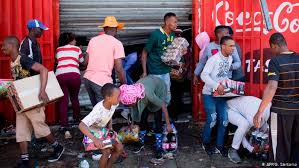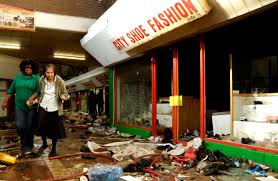The South African Xenophobia and its effects on the Nigerian owned businesses based in South Africa
South Africa has a history of violence against foreigners. Xenophobic attacks and violence have sprung up from time to time in South African history and another major one flared again in September last year (2019) when armed mobs attacked foreign-owned businesses in Johannesburg. The clashes left at least 12 people dead. Xenophobic harassment and violence against African and Asian foreigners living in South Africa are routine and sometimes lethal, Human Rights Watch said in a report. According to the Human Rights Watch, Non-South African nationals have suffered wave after wave of xenophobic violence and live in constant fear of being targeted solely for not being South African. “The South African government should hold those responsible accountable to the fullest extent of the law. Impunity only emboldens others and perpetuates xenophobia”, South African government was admonished by the Human Rights Watch.
South African authorities took their time in acknowledging that the violence was motivated by xenophobia, preferring to classify it as crime driven. A year and a half ago, the government adopted a plan to fight xenophobia. So far, it seems to have borne little fruit. Despite the March 2019 adoption of a government action plan to combat xenophobia, the government has done very little to ensure that attacks by members of the public, the police, and government officials are investigated and that those responsible are held accountable.
The Human Rights Watch has also claimed that foreigners in South Africa are regularly scapegoated and blamed for economic insecurity, crimes, and government failures to deliver services and have been targets of nationwide protests and shutdowns characterized by mob violence, looting, and torching of their businesses. In early September 2019, mobs wielding weapons and chanting anti-foreigner slogans attacked and forcibly displaced non-nationals, destroying thousands of their business and homes. None of those interviewed has yet to recover financially or achieve justice. Although the government stated that 10 of the 12 killed in the violence were South Africans, Human Rights Watch has found that at least 18 foreigners were killed during the violence.
 The South African Xenophobia and its effects on the Nigerian owned businesses based in South Africa
The South African Xenophobia and its effects on the Nigerian owned businesses based in South Africa
Sometimes last year, South Africa’s President Cyril Ramaphosa told the BBC that he felt ashamed by the recent violence. “We are very concerned and of course as a nation, we are ashamed because this goes against the ethos of what South Africa stands for,” he said.
Effects of SA xenophobic attacks on Nigerian businesses
These xenophobic attacks against foreigners living in South Africa have damaged the image of the country as an investment destination. Experts have been saying that political stability is a major factor when it comes to putting money into a country and the pictures of the attacks in South Africa are giving major investors some serious concerns. In effect, the waves of xenophobic attacks on Nigerians living in South Africa bring into stark reality the preponderance of the Nigerian business community in the post-apartheid South African economy. The attacks in which more than 60 persons were killed and thousands displaced attracted diplomatic intervention by the Nigerian state. Even though no Nigerian was killed in the wake of the violent xenophobic attack, many Nigerians lost their properties and their shops and businesses were looted; an indication of an orchestrated attack on the businesses of Nigerians in South Africa. The report that no Nigerians were killed in the violence in South Africa is only a speculation, however, Nigerian-owned shops and businesses are believed to have been targeted by the mobs.
Mob attacks on foreign-owned shops in Johannesburg have damaged relations between South Africa and Nigeria. Many of the mobs live in apartheid-era hostels, squalid shelters for workers away from home long known as breeding grounds for ethnic violence. Work in Johannesburg is hard to find. Unemployment is over 50 percent for those under thirty-five, while among the entire working-age population it is almost 30 percent. In terms of education and training, many or most of the newly-arrived are ill-equipped to enter the modern economy. Elite educational institutions have become racially integrated, but they serve a tiny proportion of the population.
Again, reflecting apartheid strictures on black self-employment, the informal sector of South Africa’s economy is smaller than what it is in Nigeria. In Lagos, a far poorer and less developed city than Johannesburg, everybody has a hustle. Begging among southern Nigerians is rare; those that beg are usually from elsewhere in Nigeria or West Africa. The popular culture is highly entrepreneurial. Hence, when Nigerians emigrate, and millions do so all over the world, they often set up small enterprises, creating wealth, but also engendering envy.
Read Also: How to Start a Shea Butter Production in Nigeria
Recently there was news concerning the attacks by Nigerians on businesses in Nigeria that are perceived to be South African in origin. These attacks in different parts of Nigeria are said to be an expression of anger by the Nigerian youths over the ill-treatment of Nigerians in South Africa, and the destruction, vandalization, and looting of Nigerian businesses based in South Africa. The offices of South Africa telecommunications giant MTN in the southwest city of Ibadan were set ablaze while the company’s office in Uyo in the southeast was attacked by an angry crowd that vandalized properties, according to local newspaper reports. Shattered glass, tires, and damaged printers lay in the vandalized MTN shops in the Surulere neighborhood of Lagos. The Lagos outlet of South African clothing retailer PEP in Surulere was also attacked and looted.
 The South African Xenophobia and its effects on the Nigerian owned businesses based in South Africa
The South African Xenophobia and its effects on the Nigerian owned businesses based in South Africa
Nigeria and South Africa are Africa’s largest economies. Nigeria has a large immigrant community in South Africa while South Africa has huge business interests in Nigeria. These include telecommunications, banking, energy, hotel, and media. However, years of xenophobic attacks on Nigerians living in South Africa have led to growing sentiments against South African companies doing business in Nigeria, with many Nigerians calling for their closure. All of these are happening because of what Nigerians, businesses, and properties are being subjected to in South Africa.
As a testimony to the reality of Nigerians suffering ill-treatment in South Africa, there was a mass protest by South African women married to Nigerians in August 2013 on the street of Johannesburg under the shield of the United Nigerian Wives in South Africa (UNWISA), an umbrella organization established to protect their interest. The group gathered to fight against alleged stigmatization, discrimination, and humiliation by government departments, agencies, and officials of the South African state. The protest march which eventually ended at the city of Johannesburg home affairs office threatened to continue in Nigeria with the intention of persuading the Nigerian government to react by stopping South African businesses operating in Nigeria. To be sure, the Nigerian government chose to be cautious and observe proceedings before making an official statement on the matter, since the event had occurred shortly after a major diplomatic strain in her relations with South Africa over yellow fever cards.
Recommendation and parting words
In view of the foregoing, Nigerian businesses domiciled in South Africa are mostly strained. Having been attacked severally, several entrepreneurs are considering relocating their businesses, which provides notable sources of employments even to South Africans, out of the country.
The South African government must intensify efforts to empower the black population in post-apartheid South Africa in other to resolve the contradictions of apartheid and ensure a free society for all. Similarly, the white minority that holds the commanding heights of the post-apartheid South African economy must show the willingness to open the space for competition and inclusion. In the particular case involving Nigeria-South Africa relations, both countries must strengthen the instrumentality of the Nigeria-South Africa Bi-National Commission as a veritable platform to resolve diplomatic issues speedily before they degenerate into avoidable problems. In the same vein, Nigeria and South Africa must move above rhetoric and embrace their continental responsibility of Africa’s development and renaissance.
Hope you enjoy this article?
Share your thoughts in the comment session.
Contact us today for your business consultancy and business advisory services. We can help you fine-tune your idea, structure your business, market your business, train your staff, consult on your retirement plan, coach you for financial success. We also write a business plan and help with fundraising strategies and Grant applications. We can help you start, grow, and expand your business.
Call or WhatsApp us now on 081 0563 6015, 080 7635 9735, 08113205312 or send an email to dayohub@gmail.com and we will solve any of your business problems.
Related